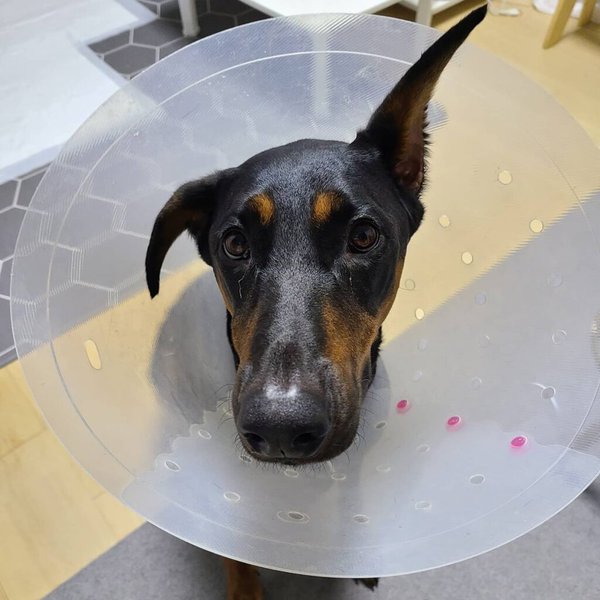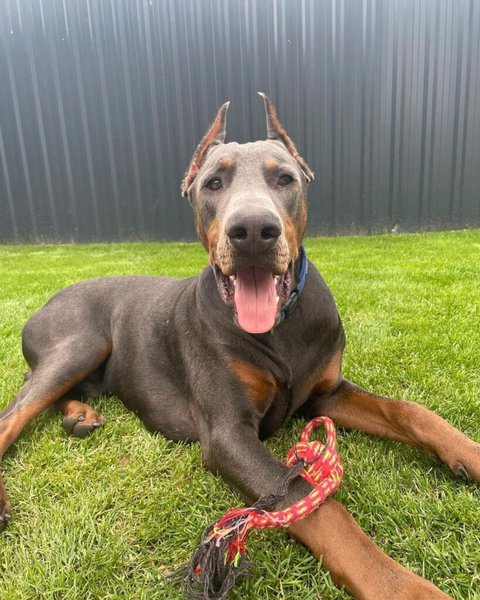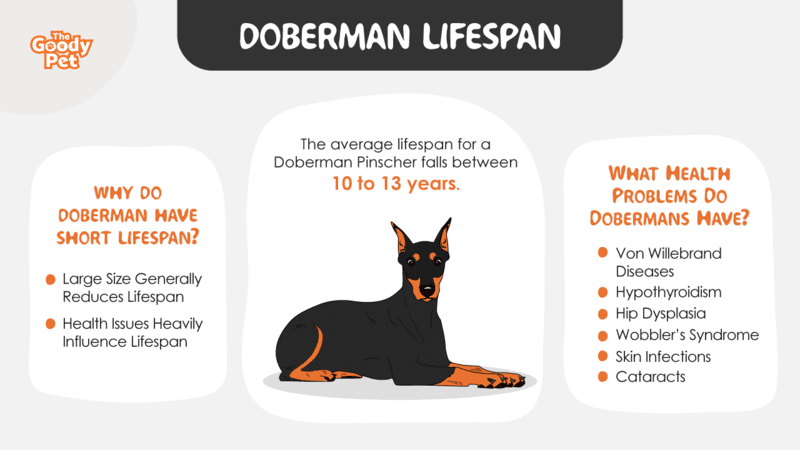Some of the questions frequently asked by Doberman owners is how long their dear fido will be around for, and health issues that this pooch mostly suffers from. And it is these questions that are key to the motivation behind this article.
So, what are the common health issues of a Doberman Pinscher? A Doberman Pinscher is predisposed to several health issues such as the deadly dilated cardiomyopathy, bloat and cancer. Other health issues typically found in Dobermans include Von Willebrand disease, wobbler’s syndrome and hypothyroidism among others.
Dobermans have a relatively short lifespan, and if care is not taken, the health conditions listed above can make this pooch’s life even further. Information on how to properly take care of a Doberman, as well as medical conditions you should be on the lookout for are contained in this article. But before we go further, let’s examine why Doberman Pinschers have a relatively short lifespan.
Why Do Dobermans Have Short Lifespan?
The average lifespan for a Doberman Pinscher typically falls between 10 to 13 years.
And when compared to that of smaller dogs that typically live longer, the general conclusion is that Doberman Pinschers have short lifespans.
There are several factors that are responsible for why Dobermans seemingly have shorter lifespans and some of these include:
Size Affects Lifespan
Generally, the larger the size of a dog, the shorter the period this dog is expected to be around for.
Doberman Pinschers are an impressively large dog breed, and this places the pooch at a higher risk of suffering from health conditions that are peculiar to the larger dogs.
And although this is yet to gain widespread acceptance scientifically, few studies carried out by interested parties have arrived at the conclusion that large dog breeds tend to age faster than smaller breeds, consequently causing a shorter lifespan for big dogs such as the Doberman.
Health Issues Heavily Influence Lifespan
The Doberman is at risk of suffering from severe health conditions, and these can significantly shorten this pooch’s lifespan. Information on the health issues that Dobermans typically face during their lifespans is provided in subsequent sections of this article.
At What Age Do Dobermans Slow Down?
We’ve stated how Dobermans typically live for between 10 to 13 years, and if you own one of these pooches, you can expect it to naturally start slowing down from when it clocks 10 years of age.
This figure isn’t set in stone however, and it is quite possible for a Dobie to live well into its teens before it starts showing signs of slowing down. Similarly, a Doberman is prone to several health conditions, some of which can cause the pooch to die at a relatively early age.

What Health Problems Do Dobermans Have?
Doberman Pinschers are renowned for their athleticism and outstanding strength. But like all other dogs, poor maintenance, and unhealthy genes can make this pooch fall really sick.
That said, some of the health issues that Dobermans are predisposed to include:
- Von Willebrand disease
- Hypothyroidism
- Hip dysplasia
- Wobbler’s syndrome
- Skin infections
- Cataracts
It is important to note that these diseases are seldom fatal, and the medical conditions that typically cause Doberman deaths are outlined below:
What Do Dobermans Usually Die From?
Health conditions that are commonly responsible for Doberman deaths worldwide include:
Dilated Cardiomyopathy
Doberman Pinschers are particularly prone to suffering from dilated cardiomyopathy (DCM), a life-threatening heart condition characterized by a weakening or abnormal enlargement of the pooch’s heart, such that it can no longer pump blood effectively.
Dilated cardiomyopathy in Dobermans largely goes under the radar, and in several cases, this disease isn’t diagnosed until after the pooch is dead.
Studies have estimated that 70% of Dobermans worldwide are carriers of this ailment, and it is also expected that this figure will rise significantly in the nearest future.
Cancer
Dobermans, like the majority of other dog breeds, are prone to suffering from cancer. And this silent killer is responsible for a significant percentage of yearly Doberman deaths.
Common occurrences of cancer among Doberman Pinschers include cancer of the mammary glands, mast cell tumors, malignant lymphoma, and soft tissue sarcomas, among others.
What makes cancer mostly fatal for Dobermans is that the disease is hard to diagnose until symptoms have progressed to a reasonable extent. And also, there are no genetic tests that can screen for cancer predisposition in a Doberman pooch.
Bloat
Dobermans are prone to several stomach issues, but the most fatal is the Gastric Dilatation Volvulus, commonly referred to as bloat.
Bloat is an emergency medical condition that is characterized by a twisting of the Doberman’s stomach, thereby leading to a build-up of gas and an obstruction to the flow of gas and food around the pooch’s body.
Gastric Dilatation Volvulus progresses fairly quickly. And if left unattended to, bloat can end a Doberman’s life in as little as 30 minutes!

Learn To Read The Danger Signs – How Do I Know If My Doberman Is Dying?
Familiarising yourself with the signs exhibited by a dying Doberman is important in emotionally preparing you to deal with the loss of your dear fido, as well as enabling you to make preparations to make your pooch’s final days on earth as comfortable as possible.
And in the case of a treatable medical condition, the knowledge that something is wrong with your pooch will assist you to take prompt action, and, maybe, extend your Doberman’s life.
That said, some of the signs commonly exhibited by dying Dobermans include:
- Lethargy
- Loss of appetite
- Loss of weight
- Incontinence
- Breathing difficulties
- Lower body temperature
Lethargy
Dying Dobermans will display an unwillingness to participate in activities that were once of interest. Additionally, you will observe a dying Doberman sleeping more, and the pooch’s personal hygiene will typically be abysmal.
What You Can Do To Help
- Provide lush blankets to make the pooch sleep more comfortably.
- Assist with gentle grooming.
Loss Of Appetite And Weight
A dying Doberman will typically eat less food, and this causes the pooch to lose quite a few pounds. This loss of weight can either be gradual or drastic, and it is typically accompanied by the wasting of body muscles.
What You Can Do To Help
- Provide smaller meals and offer to feed only what the pooch loves eating.
- Consult your vet to recommend an appetite stimulant.
Incontinence
Commonly observed in older Dobermans, incontinence is characterized by a loss of control over bladder and bowel movements, thereby resulting in an increase in the occurrence of excretory accidents around the home.
What You Can Do To Help
- Adopt the use of special doggie diapers.
Breathing Difficulties
Dobermans nearing the end of their lives typically find it harder to breathe, and their breathing comes in labored, irregular patterns.
What You Can Do To Help
- Cut down on strenuous exercises like running for prolonged periods.
- Because this is a delicate situation, the best course of action will be to consult your vet, who can then make an appropriate recommendation after examining the pooch.
Lower Body Temperatures
Body temperatures in dying Dobermans typically become abnormally low, such that when you feel a dying Doberman’s body, it is usually cooler to the touch.
What You Can Do To Help
- Make the atmosphere in the home as warm as possible for the pooch.
- You can also provide blankets to keep the Doberman warm.
NOTE: As stated earlier, the symptoms listed above may occur due to a treatable medical condition; Hence, upon observing any of the signs outlined above, it is vital that you consult with your vet to examine whether your Doberman is dying a natural death or whether the situation can be remedied.

How To Take Better Care Of Your Doberman?
Diet
The best food for healthy growth in Dobermans is one that’s rich in animal-based protein that helps build up the pooch’s muscles. Carbohydrates and healthy fats help keep a Doberman energized, and the ideal meal for a Dobie should contain a significant amount of carbs. Vitamins and minerals also help bolster a Dobie’s immune system, and should form a considerable part of this pooch’s meals.
Dobermans do well on dry kibble, a raw food diet, well-prepared homemade meals, as well as well processed wet dog food. And when it comes down to choosing from the several high-quality wet dog food products available on the market, our pick for the ideal Doberman food is the Pet Plate meal plan.
The Pet Plate diet is thoughtfully prepared with food ingredients that will facilitate healthy growth and physical development in your Doberman. And you also have the option of submitting your Doberman’s unique physical characteristics to get a customized meal plan.
Dietary supplements are effective at maintaining the Doberman’s trademark shiny coat, and these should be added sparingly to the pooch’s meals. We recommend that you supplement your Doberman’s meals with the Multivitamin Treats Supplement – Zesty Paws Probiotics to bolster your fido’s nutritional intake and strengthen the pooch’s immune system.
What Should Dobermans Not Eat?
Certain food substances, when consumed by Dobermans, can be quite toxic and detrimental to the pooch’s health.
You should avoid giving your Doberman food that contains chocolate, coffee, xylitol sugar, grapes, and alcohol. Onions, chives, garlic, raw eggs and persimmons are also a no-go when it comes to Doberman food.
Similarly, you should watch out for food products that have a high percentage of fillers, grains and animal by-products, as they are typically of lower quality, and generally unhealthy for a Doberman to consume on a regular basis.
Dobermans are also prone to food allergies; Hence, you should get acquainted with food substances that trigger reactions in your Doberman, and avoid feeding them to the pooch.
Exercise
An important, and mostly overlooked aspect, of maintaining a Doberman’s physical and mental health is regular exercising. Dobermans are an energetic, large-dog breed; hence they require a significant amount of physical activity per day.
That said, it is recommended that you engage your adult Doberman in two hours of exercise, broken into smaller sessions, every day.
The exercise for a Doberman can be in the form of a long walk or hike to build physical endurance and muscle mass, or swimming and agility training. You should also, occasionally, let your Doberman out in the yard to run around, and maybe, play with other dogs.
For a Doberman Pinscher, mental stimulation is just as important as physical condition. And this pooch should be regularly engaged in activities that will keep it mentally alert and active. Puzzles, games mimicking a scavenger hunt, and interactive toys are particularly effective at mentally stimulating a Doberman.
Related Questions
What Is The Longest Living Doberman? While there is no officially documented record of the longest-living Doberman, there are several claims of Doberman pooches living well into their 20s. And while the average lifespan of the Doberman dog typically falls between 10 to 13 years, it is quite possible for this pooch to live into its 20s with top-notch care and excellent genes.
How Much Does A Doberman Cost? Doberman puppies typically cost between $500 to $2,250, with an average price tag of $1,000. And when purchasing a Doberman pooch, it is very important that you only do business with reputable breeders or shelters, as they offer some sort of guarantee on the dog’s health and longevity.
How Long Do Doberman Mixes Live? Generally, Doberman mixes tend to live for between 10 to 12 years. And when compared to the average lifespan of a purebred Doberman which typically ranges between 10 to 13 years, it’s clear to see that there’s not a great deal of difference in the life expectancy of both pooches.





